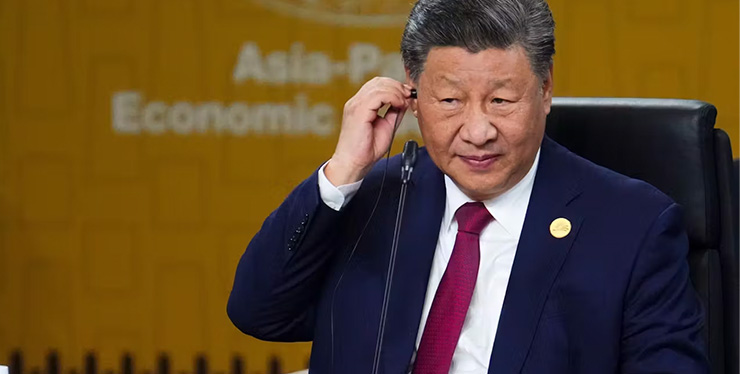
Why America would lose a trade war with China
During his election campaign, President Donald Trump threatened to impose 35% to 45% tariffs on Chinese imports to force China into renegotiating its trade balance with the U.S. The immediate result of that would be a fierce trade war that America would almost certainly lose. And while we don’t know yet whether Trump will follow through with this threat, his abandonment of the Trans Pacific Partnership (TPP) in his first few days in office is an indication that he is not shying away from his campaign pledges.
Trump is now entering uncharted waters. He has already demonstrated his ignorance of Asian affairs when he publicly accepted a phone call from Taiwan’s president, Tsai Ing-wen, in December, and shortly afterwards announced that he didn’t understand the “One China” policy, or why he should respect it. His abandonment of the TPP will simply accelerate China’s displacement of America as the world’s leading economic power.
For the moment, China has decided to wait for the U.S. to make the first move. A trade war would be problematic for the region, not least for South East Asia, which would be most likely to suffer negative fallout as a major trade partner to both the U.S. and to China. But it would not be a disaster for China, mainly because the U.S. needs China more than vice versa.
Unfortunately for Trump, it’s not the 80s anymore. Twenty years ago, the situation might have been different. China was dramatically underdeveloped, and it wanted access to Western technology and manufacturing techniques. China has most of what it needs now, and what it doesn’t have it can easily obtain from vendors outside the U.S. While the American market looked enticing a few decades ago, it is relatively mature, and today the newer emerging market countries have become much more interesting to Beijing.
The fastest growing markets for the best items China produces, like laptop computers and cell phones, are in developing regions such as India, Latin America, and Africa. In contrast, China itself is a market that the U.S. can hardly ignore. By the end of 2015, Chinese consumers had bought 131 million iPhones. The total sales to U.S. customers during the same period stood at only 110 million. And iPhones are only a small part of U.S. exports. Boeing, which employs 150,000 workers in the U.S., estimates that China will buy some 6,810 airplanes over the next 20 years, and that market alone will be worth more than $1 trillion.
Were Trump to start a trade war, the most immediate effects would probably be felt by companies like Walmart, which import billions of dollars of cheap goods that are bought mostly by the people who voted Trump into office. The prices on almost all of these items would quickly skyrocket beyond the reach of the lower economic brackets—not because of manufacturing costs, but because of the tariffs. The result would be an economic war of attrition that China is infinitely better positioned to win.
China’s foreign currency reserves now stand at more than $3 trillion. In contrast, the U.S. has foreign exchange reserves that hover at around $120 billion. Trump’s tariffs would automatically trigger penalties against the U.S. in the World Trade Organization (WTO), and might even lead to the WTO’s collapse, which would lead to higher tariffs against U.S. exports. While it might take a while for that to happen, the turmoil would be catastrophic for American business and employment. China, on the other hand, would emerge relatively unscathed.
In fact, the importance of the U.S.-China relationship is already being challenged by other players. Apple’s iPhone sales in China are running into competition from local Chinese manufacturers, and Samsung is more than happy to fill any void that the Chinese can’t deal with. Likewise, the Chinese would happily shift their trillion dollars in future aircraft purchases to Airbus, a European firm that is already building a plant in China to finish assembly of large, twin-aisle jets. As for automobiles, most Chinese would just as soon drive a Mercedes, BMW, or Lexus as a Ford.
Both China and leading economic experts hope that a trade war won’t happen. The American political system is relatively mature with checks and balances, but with a president who often acts uniquely based on his own beliefs regarding complex issues, almost anything is possible.
Professor Winter Nie is the regional director of Southeast Asia and Oceania for IMD business school.
This article first appeared in The Hill and Forbes Asia.
Research Information & Knowledge Hub for additional information on IMD publications
This paper presents a compact and intuitive framework that consolidates, simplifies, and extends results on the links between technology, trade, and labour market outcomes. It makes three main contributions. First, it presents closed-form solution...
Consumer-voters and the processing industry are the sure losers of the trade war against China that Trump will carry on with renewed energy.
Brookfield’s Catalytic Transition Fund is a case study in how the financial industry can spearhead sustainable development. Brookfield Asset Management announced an initial closing of $2.4 billion for the Catalytic Transition Fund, marking a signi...
The China Resources Beer (CR Beer) case study is a compelling narrative of the world’s largest beer producer by volume under the leadership of CEO Hou Xiaohai. In 2016 CR Beer embarked on a pivotal transformation journey. This case study offers cr...
Many American politicians contend that Chinese imports delivered a blow to manufacturing jobs, especially in the Rust Belt states. President Trump wants to fix the employment loss by raising import tariffs. Simulating the job, wage, and inflation ...

Within days of Donald Trump’s election win in November 2024, China’s president Xi Jinping was at a ceremony opening a deep-water port in Peru as part of a “diplomatic blitz” through Latin America. Xi’s presence was a symbol of China’s rising influ...
Research Information & Knowledge Hub for additional information on IMD publications
Research Information & Knowledge Hub for additional information on IMD publications
in Journal of International Economics 23 February 2025, ePub before print, 104065, https://doi.org/10.1016/j.jinteco.2025.104065
Research Information & Knowledge Hub for additional information on IMD publications
Research Information & Knowledge Hub for additional information on IMD publications
Research Information & Knowledge Hub for additional information on IMD publications
Research Information & Knowledge Hub for additional information on IMD publications
Research Information & Knowledge Hub for additional information on IMD publications
20 January 2025, Global Trade Alert Report, cBrief 4: Game On
Research Information & Knowledge Hub for additional information on IMD publications
in The Conversation 9 January 2025
Research Information & Knowledge Hub for additional information on IMD publications
Research Information & Knowledge Hub for additional information on IMD publications





